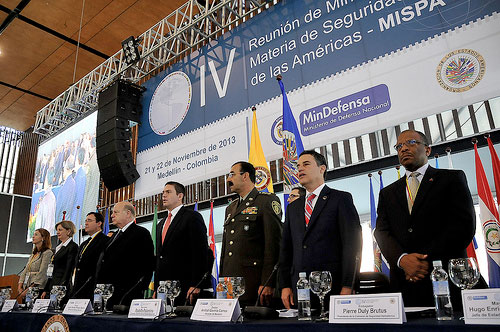|

|
 |
|
Last Updated: Feb 6, 2017 - 2:32:04 PM |

|
The Fourth Meeting of Ministers Responsible for Public Security in the Americas (MISPA IV) of the Organization of American States (OAS), which concludes today in Medellin, Colombia, heard reports from Colombia, Chile, Costa Rica and Venezuela on their experiences regarding Joint Investigation, Crime Observation and Forecasting as a basis for further discussion among all member states.
The Director of the Department of Public Security of the OAS, Paulina Duarte, stressed the importance of the presentations by the four member states, which describe "different experiences based on scientific methodologies which are essential for public security policies in the region." The OAS official said the contributions "allow for the generation of reliable and comparable statistical data, which are essential elements for the development and implementation" of government policies by the member countries.
The Director General of the National Police of Colombia, Major General Jorge Nieto, gave a presentation on "Methods of criminological investigation and foresight." General Nieto explained that the methodology used by the Colombian body is based on the integration of the capabilities of a state in a way different to the performance of the public security forces. In this regard, he said the goal is to focus the analysis of the information received and then prioritize actions to take and the definition of the main lines of action and the "strategic and operational priorities" of the National Police of Colombia.
For his part, Rodrigo Ubilla, Undersecretary of the Interior of Chile, and Enrique Bassaletti, Police Lieutenant Colonel of the South American country, made a presentation on "Progress on the Quadrant Plan and implementation of the Criminal Analysis Tactical System." Both stressed the existing tradition in the country, in that its security policies and strategies have a trajectory independent of the governments in power. Regarding the "Quadrant Plan," they explained that consists of developing police services oriented toward prevention in the territorial area of a quadrant (its size depends on the area of intervention) by incorporating modern techniques of operational management. Undersecretary Ubilla stressed the importance of always remembering that the end goal is to improve the quality of life of the people, aiming to decrease victimization and enhance the perception of security. For his part, Lieutenant Colonel Bassaletti said "crime is multi-causal" and that, following that logic, should be approached from different perspectives.
The Minister of the Interior, Police and Public Security of Costa Rica, Mario Zamora, made a presentation entitled "Elements for a new criminal policy to address new forms of criminal behavior,” in which he explained how the police of his country use a model of “Flagrancy Courts” which allows for a judgment on the same day to a person who has been caught committing a crime "in the act." Zamora reported that the program of Flagrancy Courts began in San Jose, Costa Rica five years ago, and has been expanded across the entire territory of the country with immense popular appeal. Minister Zamora said, in the case of crimes committed "in the act," the level of processing had increased from 3 to 90 percent. In the same vein, he said the inclusion of the concept of flagrancy in Article 422 of the Criminal Procedure Code of Costa Rica and praised its efficiency, as its use has increased the success in the fight against crime without increasing repression by security forces.
The Director of the Venezuelan Observatory of Public Security (OVS), Jesús Oswaldo Escobar explained that to collect, categorize, process, analyze and collate the information received from the different security institutions of the country, the lead agency uses a technological tool that will facilitates the planning, formulation and integral implementation of the strategies and actions of public security through integration of data from different security agencies.
For more information, please visit the OAS Website at www.oas.org.

© Copyright 2013 by thebahamasweekly.com
Top of Page
|
|
 |

|
